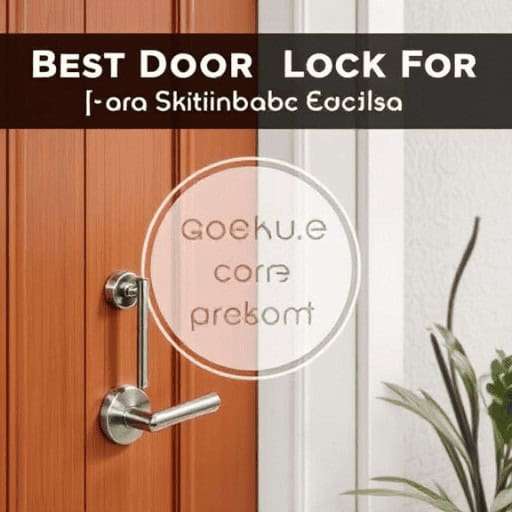Airbnb rentals require reliable door locks that ensure guest safety and simplify access management for hosts. As short-term rental markets grow, securing properties with the right door locking systems becomes a priority.
Door locks for Airbnb rentals must be robust and secure, while also providing convenience for hosts and guests to ensure smooth check-in and check-out without compromising safety.

The rise of smart Home technology has introduced innovative access solutions tailored for Airbnb hosts. These locks enable keyless entry via codes, apps, or biometric data, reducing logistical challenges associated with physical keys. By adopting these technologies, hosts can remotely control access, generate temporary guest codes, and monitor entry activity, thereby enhancing security and flexibility.
Security remains paramount in short-term rentals, where frequent guest turnover increases vulnerability. Guests expect seamless, secure access, while hosts need to protect their property and manage multiple bookings efficiently. Effective door lock systems address these needs by integrating secure mechanisms with easy-to-use interfaces.
This comprehensive guide reviews the best door locks for Airbnb rentals, covering top models, essential features, lock types, and integration options. Additionally, it offers insights into installation, maintenance, and user experiences to help hosts select locks that maximize safety, efficiency, and guest satisfaction.
The Best Door Lock for Airbnb Rentals in 2026
Choosing the best door lock for Airbnb rentals involves finding a solution that balances security, convenience, and integration capabilities. Top locks offer robust build quality to deter break-ins alongside cutting-edge smart functions tailored for short-term rental operations.
Features such as remote access management, temporary code generation, and audit trails enable hosts to effectively safeguard and manage rental properties from anywhere.
Smart locks designed for rentals prioritize user-friendly interfaces that allow guests to check in without physical keys, improving the guest experience and reducing door-related complications. Many models offer wireless connectivity options (Bluetooth, Wi-Fi, or Z-Wave), enabling seamless integration with property management systems and voice assistants.
Consideration of installation complexity and compatibility with existing doors is crucial to avoid costly or cumbersome retrofit challenges. Furthermore, evaluating battery life, backup entry options, and customer support helps ensure ongoing reliability in high-turnover rental environments.
This section calculates detailed assessments of the seven best door locks suited for Airbnb rentals, focusing on security ratings, technological advantages, and user feedback. The goal is to streamline hosts’ decision-making by providing qualified information that emphasizes safety, ease of use, and cost-effectiveness.
The Best 7 Best Door Lock for Airbnb Rentals Reviews
August Wi-Fi Smart Lock
August’s Wi-Fi Smart Lock is renowned for its user-friendly app and seamless guest access management. Supporting keyless entry with customizable virtual keys, hosts can remotely grant or revoke access. The lock retrofits over existing deadbolts, preserving traditional key usage for owners.
Its built-in Wi-Fi hub negates the need for additional accessories, ensuring easy installation. Its auto-lock feature and door status notifications bolster security. Positive user reviews praise August’s reliable connectivity and integration with Alexa, Google Assistant, and HomeKit.
Schlage Encode Smart Wi-Fi Deadbolt
The Schlage Encode offers robust ANSI Grade 1 security with built-in Wi-Fi connectivity. Compatible with Alexa and Google Assistant, it allows voice control and real-time monitoring without an external hub. The keypad supports multiple codes with flexible scheduling for guests.
Hosts value its straightforward installation and strong security track record. Its durable metal finish and bright touchscreen enhance aesthetics and functionality, making it a favorite among homeowners managing Airbnb properties.
Yale Assure Lock SL with Z-Wave
Yale’s Assure SL is a sleek touchscreen deadbolt with Z-Wave compatibility, enabling integration into smart Home ecosystems. It supports keyless access via codes and app control via compatible hubs such as Samsung SmartThings.
Its slim design complements door aesthetics while providing high security with ANSI Grade 2 certification. Reviewers emphasize Yale’s dependable performance and ease of programming multiple user codes suited for guest access management.
Wyze Lock
Wyze Lock presents an affordable smart lock with robust features, including auto-lock/unlock, guest key sharing via app, and voice assistant support. It works with existing deadbolts and offers Bluetooth and Wi-Fi connectivity.
Users appreciate Wyze’s straightforward installation and budget-friendly pricing, without compromising essential smart features, making it particularly appealing to hosts managing multiple rentals.
Ultraloq U-Bolt Pro
Ultraloq’s U-Bolt Pro combines fingerprint, keypad, mechanical key, and app access in one compact unit. It supports Bluetooth and Wi-Fi (with a hub), enabling multiple user profiles and temporary visitor access.
Its rugged construction ensures durability, while users praise its diverse access methods, which accommodate varied guest preferences and improve security and convenience.
Lockly Secure Pro
Lockly offers advanced security with patented 3D fingerprint sensors and an encrypted touchscreen keypad that randomizes the button layout to protect against wear-pattern hacking. Wi-Fi connectivity supports remote management.
Host feedback highlights Lockly’s cutting-edge access control and strong encryption as key in protecting short-term rental properties from unauthorized entry.
Nest x Yale Lock
A collaboration between Nest and Yale, this lock integrates deeply with Google ecosystems, offering keyless entry via app, voice control, and customizable access codes. Its minimalist design houses a powerful deadbolt meeting high security standards.
Guests and hosts alike benefit from seamless integration with Google Nest products alongside secure, flexible access control.
Importance of Security in Short-Term Rentals
| Aspect | Description | Impact on Hosts and Guests | Recommendations |
|---|---|---|---|
| Unauthorized Entry Risk | Frequent guest turnover increases the chance of lost/stolen keys | Hosts face potential damage, guests fear a lack of safety | Employ smart locks with remote control and temporary codes |
| Key Management Complexity | Physical keys require manual distribution and collection | Logistically challenging and prone to human error | Digital key sharing reduces hassle and risks |
| Real-Time Monitoring | Ability to track lock status and entry times remotely | Enables prompt response to unusual access or emergencies | Use locks with app notifications and access logs |
| Flexible Access Control | Customisable permissions per guest/staff | Enhances security while accommodating varying access needs | Prioritize locks allowing temporary or scheduled access |
| Increased Guest Convenience | Simplifies check-in/check-out, enhancing guest experience | Boosts positive reviews and repeat bookings | Smart code or app entry preferred over physical key |
| Compliance with Hospitality Standards | Ensures secure property protection aligned with industry expectations | Protects host’s reputation and liability | Select locks certified for residential use and security durability |
| Integration with Management Software | Streamlines multiple rental property oversight | Reduces administrative workload for hosts | Confirm compatibility with Airbnb, VRBO, or PMS platforms |
Effective security tailored to short-term rental demands mitigates risk while elevating satisfaction and operational efficiency.
Key Features to Look for in Airbnb Door Locks
When evaluating door locks for short-term rentals, consider the following:
Multiple Access Methods: Support for codes, biometrics, smartphone apps, and mechanical keys provides flexibility for guests and backups for hosts.
Remote Management: The ability to lock/unlock and to monitor usage remotely reduces the need for in-person key handoffs.
Temporary Codes and Scheduling: Enables dynamic access control, allowing entry only during valid booking periods.
Integration with Airbnb or PMS: Seamless compatibility with rental management systems automates code generation and access logging.
Durability and Weather Resistance: Locks installed on exterior doors must withstand rain, dust, and temperature changes.
Battery Life and Alerts: Long-lasting power and low-battery notifications reduce the risk of lockouts.
Easy Installation: Compatibility with common door sizes and existing deadbolts ensures a simple retrofit.
Guest-Friendly Interface: An intuitive keypad or app reduces confusion and improves the experience.
Security Certifications: ANSI or equivalent grading guarantees tested protection against forced entry.
User Capacity: Support for multiple user accounts enables efficient management of frequent guests or service providers.
Selecting locks with these attributes secures rental properties while streamlining interactions between hosts and guests.
Types of Door Locks: Smart Locks vs. Traditional Locks
Traditional locks, while simple, rely on mechanical keys and present numerous challenges for Airbnb hosts, including lost keys, rekeying costs, and logistical hurdles for multiple guests. Smart locks offer digital solutions that eliminate reliance on physical keys, enable remote management, and enhance security.
Smart locks vary from basic keypads to biometric and fully app-controlled systems. They offer temporary access codes, guest management, and real-time tracking, which are not available with traditional locks. However, smart locks require batteries, Wi-Fi or Bluetooth connectivity, and digital literacy.
Traditional locks remain reliable and require no power, but rising rental demand and guest expectations are driving the adoption of smart locks. Often, combining smart locks with mechanical backup keys strikes a balance between convenience and safety.
Top 5 Smart Door Locks for Airbnb Rentals
August Wi-Fi Smart Lock – Integrates directly with existing deadbolts, offering virtual keys and automatic locking for seamless guest access management.
Schlage Encode Smart Wi-Fi – Durable build with built-in Wi-Fi and multiple access options, integrating with Alexa and Google Assistant for voice commands.
Yale Assure Lock SL – Touchscreen deadbolt with Z-Wave compatibility supporting traditional and app-based entry, ideal for smart home setups.
Ultraloq UL3 BT – Flexible biometric and keypad access with Bluetooth control, featuring a rugged design suitable for varied environments.
Lockly Secure Pro – Advanced fingerprint recognition and an encrypted keypad that randomizes keys, enhancing digital security in rental applications.
These locks provide secure, convenient, and technologically advanced solutions fit for Airbnb hosts’ needs for flexibility and reliability.
Review of Keyless Entry Options
Keyless entry replaces physical keys with PIN codes, fingerprint scanners, or app-based access. PIN pads are popular for ease of use and low maintenance. Fingerprint scanners increase security by tying access to unique physiological identifiers. Smartphone-controlled locks allow hosts to remotely issue or revoke access and monitor activity logs.
These systems reduce the risk of lost keys and improve the guest experience by making check-in easier. Many keyless locks also offer temporary code generation that expires automatically at the end of the booking period, enhancing property security.
Considerations for Lock Integration with Management Software
Integrating door locks with property management systems (PMS) or Airbnb platforms can automate access management. Hosts can generate unique codes per reservation or grant app access linked to guest profiles. Integration helps synchronize bookings and reduce manual code-sharing errors.
When choosing a lock, confirm compatibility with third-party PMS such as Guesty or Lodgify, or with direct Airbnb integration via Wi-Fi-enabled locks. Ensure APIs are secure and updates are reliable to minimize access issues.
Recommendations for Installation and Maintenance
1. Verify door compatibility and existing lock type before purchase.
2. Follow manufacturer instructions or hire professionals for installation to ensure reliability.
3. Regularly test lock functions, including code generation and app connectivity.
4. Replace batteries proactively to avoid lockouts or functionality loss.
5. Clean keypads and fingerprint sensors gently to maintain responsiveness.
6. Update lock firmware and app software to sustain security and fix bugs.
7. Maintain physical backup keys securely for emergencies.
Proper setup and upkeep optimize lock longevity and performance.
User Experience: Guest Convenience and Security
Guests favor keyless entry for its simplicity, as it eliminates waiting for physical keys or complex check-in procedures. Many appreciate the flexibility of multiple entry methods, especially fingerprint or app-based entry.
Hosts report improved security and peace of mind, with precise access tracking and remote control of guest permissions. The ability to generate temporary codes reduces administrative burdens and enhances guest autonomy.
Some challenges include occasional connectivity issues or guests unfamiliar with technology. Clear guest communication about entry procedures mitigates potential confusion.
Pros & Cons
Pros:
1. Enhanced security with multi-mode authentication (PIN, biometrics, app).
2. Remote access management reduces physical key complications.
3. Temporary access codes improve guest flexibility and safety.
4. Integration available with major smart home and property management systems.
5. Easy installation on standard doors with mechanical backup options.
6. App notifications provide real-time entry monitoring.
7. Durable, weather-resistant construction supports exterior use.
8. Improves guest check-in experience and reduces host logistical headaches.
9. Broad user capacity accommodates multiple guests and staff.
10. Efficient, software-updatable platforms minimize ongoing technical issues.
Cons:
1. Higher upfront cost than basic mechanical locks.
2. Reliance on battery power requires periodic charging/replacement.
3. Learning curve for non-tech-savvy hosts and guests.
Buying Guide
To select the best door lock for Airbnb rentals, follow these steps:
Confirm Door Compatibility: Measure door thickness and lock mortise type.
Evaluate Authentication Needs: Determine preferred access methods (code, app, fingerprint).
Check Security Certifications: Ensure compliance with ANSI/BHMA or equivalent standards.
Assess Connectivity Options: Wi-Fi or Bluetooth features for remote access and integration.
Consider User Capacity: Select locks that support your expected number of guests and staff.
Review Battery Specs: Look for long battery life and easy replacement or recharge.
Determine Smart Home Integration: Compatibility with Alexa, Google Home, or PMS tools.
Installation Complexity: Choose self-install if confident; otherwise, plan for professional assistance.
Read User Reviews: Valuable insights on real-world performance and usability.
Balance Budget vs. Features: Select a model that offers the best value based on the required features.
(FAQs)
Q: Can I install a smart lock on any Airbnb rental?
A: Most standard doors accommodate smart locks; interior door compatibility and Wi-Fi access should be verified.
Q: What happens if the smart lock’s battery dies during a stay?
A: Most locks include mechanical key overrides and low battery alerts to prevent lockouts.
Q: How secure are smart door locks?
A: Locks with high-level encryption and certifications provide strong security against hacking and forced entry.
Q: Can multiple guests have their own codes?
A: Yes, many smart locks support numerous unique access codes tracked independently.
Q: Are smart locks compatible with Airbnb management platforms?
A: Many locks support integration or have third-party app compatibility for automated access control.
Conclusion
The best door locks for Airbnb rentals combine robust physical security with advanced digital features that cater to the unique challenges of short-term rental management. Models like LockStar, August, Schlage, and Yale demonstrate the best balance of durability, user-friendly interfaces, and smart connectivity—essential for secure and flexible property access.
Keyless and biometric entry options enhance guest convenience and reduce administrative effort, while app-based controls allow hosts to monitor and adapt access remotely in real time. Proper installation, periodic maintenance, and integration with property management software maximize lock effectiveness, ensuring safety and improving the rental experience.
By choosing door locks designed specifically for rental contexts, hosts safeguard their investments and welcome guests with modern, seamless access systems that reflect evolving hospitality standards. Investing in smart, secure locking technology is a critical step toward managing successful, secure Airbnb properties.
#AirbnbSecurity #SmartDoorLock #KeylessEntry #HomeSecurity #RentalManagement #DigitalLock #PropertySafety #DoorLockReviews #SmartHomeDevices #VacationRentalSafety



